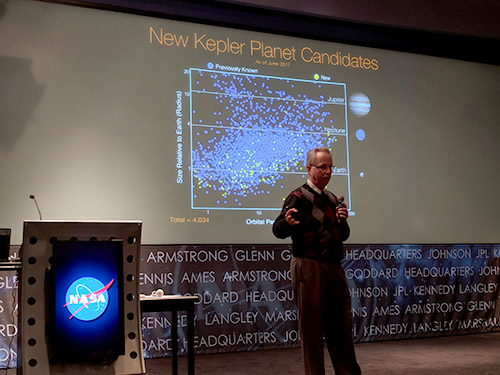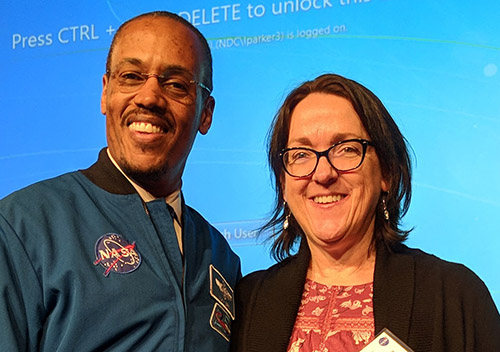When you think of NASA, you probably think of the space race, walking on the moon, or a potential mission to Mars. NASA is built on exploration and as a result of that, they have collected lots and lots of data. They currently have over 39,000 data sets! With all of this data and declining funding, NASA is turning to the community to find answers.
They have created the NASA Datanauts program to join together citizen scientists, developers, citizen activists and the curious to learn from their data, and collaborate to answer questions and build insight. Mary van Valkenburg, our data science instructor, spent a day in Washington, D.C. last week as part of the fifth cohort of Datanauts. She, along with her fellow Datanauts from around the world, heard from several NASA domain experts, and will be able to have virtual chats and collaborate on projects. Here are several of the projects they discussed.
 Paul Hertz, Director of Astrophysics at NASA, works with the Kepler mission searching for exoplanets that may support life outside of our solar system. He has a 20-year search plan and believes that Earth is not the only planet with life on it. TESS, the Transiting Exoplanet Survey Satellite, is scheduled for launch this Spring, and will use sun shades and thermal blankets to allow it to get even closer to stars than Kepler. The data Paul has gathered is available to download on open.nasa.gov.
Paul Hertz, Director of Astrophysics at NASA, works with the Kepler mission searching for exoplanets that may support life outside of our solar system. He has a 20-year search plan and believes that Earth is not the only planet with life on it. TESS, the Transiting Exoplanet Survey Satellite, is scheduled for launch this Spring, and will use sun shades and thermal blankets to allow it to get even closer to stars than Kepler. The data Paul has gathered is available to download on open.nasa.gov.
Brian Thomas, a NASA Data Scientist, is solving agency level problems. With all of the data NASA has, it’s a large job to simply manage the data and keep it accessible. His team is exploring ways to engage the public with NASA data, including attaching sound to data (sonification) and creating games that help build the open data thesaurus.
Marc Kuchner, an astrophysicist at the Goddard Space Flight Center in Maryland organizes citizen science projects for NASA. There are a couple of projects you can get involved in. The first is surveying the whole sky in infrared. WISE, a NASA mission, is looking at stars for dusty debris disks. These discs may mean that stars are in the early stages of forming planetary systems. Want to help? Visit Disk Detective
The second project, Backyard Worlds, is looking for anomalies in the sky beyond Neptune in an attempt to locate Planet 9. Want to help? Visit Zooniverse.
David Meza, Chief Knowledge Architect at the Johnson Space Center Houston, works to turn agency data into actionable insights. He works on Natural Language Processing (NLP) problems and, with Brian Thomas, has led the creation of a graph database to represent the data at NASA. We’re excited that David will be providing this graph database for our current data science cohort! The class will use the script to understand how graph databases work and may have the opportunity to work through a real-life data question.
 Of course, no visit with NASA is complete without hearing from an astronaut. Astronaut Alvin Drew has been on two spaceflights to the International Space Station and was the 200th person to walk in space. Alvin spoke about what it is like to be in space and the importance of data for space. Despite weird fluctuations in food tastes and muscle atrophy, moments like floating in the upside-down shuttle turned glass-bottom boat made his work an awe-filled experience.
Of course, no visit with NASA is complete without hearing from an astronaut. Astronaut Alvin Drew has been on two spaceflights to the International Space Station and was the 200th person to walk in space. Alvin spoke about what it is like to be in space and the importance of data for space. Despite weird fluctuations in food tastes and muscle atrophy, moments like floating in the upside-down shuttle turned glass-bottom boat made his work an awe-filled experience.
Thanks to David Meza and NASA (and all of the Nashville organizations) that have provided real-life data for use in our data science bootcamp. Real-life data adds tremendous value to our program. Working on real-life problems with real-life data has provided a framework for layering and practicing skills. Whether it’s categorizing property violations with Metro Nashville Government or exploring data that’s out of this world, it is exciting to work together with organizations to learn about the questions they are trying to answer with their data while applying newly learned techniques to explore, analyze, and visualize data to communicate insights found.







